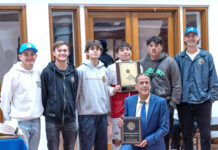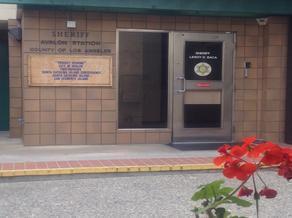I have been putting off addressing the topic of this week’s column for the better part of two years now for the simple reason that it is one of those confounding mysteries that, no matter how I twist and turn, evades resolution.
I have been putting off addressing the topic of this week’s column for the better part of two years now for the simple reason that it is one of those confounding mysteries that, no matter how I twist and turn, evades resolution.
And that would be the mystery surrounding the etymology—or historical origins—of the word “overtown.”
We hear it and use it nearly every day here on the Isle of Romance, yet do any of us know from whence it came?
But first, for non-Islanders reading this column who might not be familiar with the term, an explanation: The term “overtown” is a general term used by Catalina Islanders to refer to the mainland. It usually just applies to the Los Angeles and Orange County areas, but it can apply to more distant locations as well.
An Islander might use the term in a sentence like “I’m going overtown next week” or “My friend overtown just bought a ’57 Chevy” and so on.
As you might have guessed, a person from overtown can be referred to as an “overtowner,” though that term is rarely used and I’m pleased to say I’ve never heard it used in a derogatory manner.
Given the modest isolation of Avalon from the mainland, it’s not surprising that at least one term unique to the Island has sprung up over the years.
After all, different languages evolve from a single, common language when the speakers of that language experience separation from one another for a variety of reasons, such as geography, politics, warfare, xenophobia or what have you.
There was a time, for example, when the people of France, Spain, Italy and a few other places all spoke the same language, which is Latin.
The people of those regions, all citizens of the old Roman Empire, had regular contact with one another through such factors as family ties, inter-regional trade and, of course, the military alliances they had with Rome.
Although minor native languages were still spoken, the bulk of communication was handled using Latin.
In those days, you could travel anywhere in the Roman Empire, from Madrid to Macedonia or Paris to Peloponnesia, and not have to worry about lugging your Berlitz phrase books with you.
After the fall of the Roman Empire, however, the peoples of the Mediterranean slowly lost most of their contact with each other and the “lingua franca” known as Latin began to discombobulate.
Uncle Henri in Paris just didn’t write as often to his sobrinos in Madrid anymore and the languages began to diverge from there.
Slowly but surely, the Latin they had originally spoken began to experience regional differences first in accent, then vocabulary and later even grammatical structure.
The result over many centuries was the development of the French, Spanish, Italian and at least a dozen other languages, all of which share many commonalities nowadays, but are mutually unintelligible and therefore separate and distinct from one another.
Which brings us back to the mysterious origins of the word “overtown.” Over the years, I have asked numerous old-timers and life-long Islanders if they had any idea where it came from. When was the first time they heard it used? Who was the first person to use it?
Problem is, no one seems to know. Most life-long Islanders with whom I have spoken don’t recall hearing it before the 1960s, but then they’re not sure.
Because the usage of the phrase is so colloquial (and even frowned upon in some circles) it has apparently never been used in any official government documents and is only rarely used in local newspapers, and only recently at that. In other words, I have found no first usage that is the equivalent of a “smoking gun.”
By some accounts, the term may have been used as early as the 1890s by early Mexican immigrants. It’s possible that it emerged from a direct translation from Spanish, but since the modern-day term for the mainland used by local Spanish speakers is “el otro lado” or “the other side” it doesn’t seem likely. “The other side” doesn’t come anywhere near “overtown.”
Was the term transplanted from another location named Overtown? There are a handful of places around the world named thusly, but since none of them are even remotely near Southern California, that seems unlikely as well. The nearest place called Overtown is actually a neighborhood in Miami, Florida, while the other two are small towns in the United Kingdom.
Did an early Catalina Islander, homesick for his old stomping grounds in Florida or England, come up with the title? Sorry, I’m not convinced on that one either.
So I come to you, Dear Reader, with hat in hand, hoping for some input from those Islanders who may have knowledge of such things. As I like to say, the Island doesn’t give up her secrets easily. But perhaps there is someone out there on the Island, or even overtown, who can come up with the answer to this mystery.
Just mail your ideas or guesses to Mysterious island, c/o Catalina Islander, PO Box 428, Avalon, CA 90704. You can also email me at jim@channelcatalina.com.
Jim Watson is the author of “Mysterious Island: Catalina,” available on Amazon, Kindle and in stores all over Avalon.









